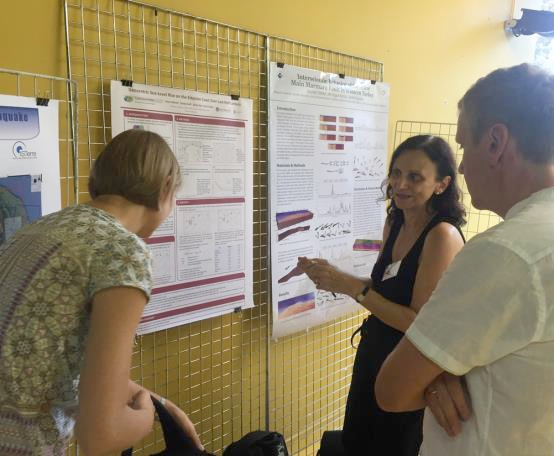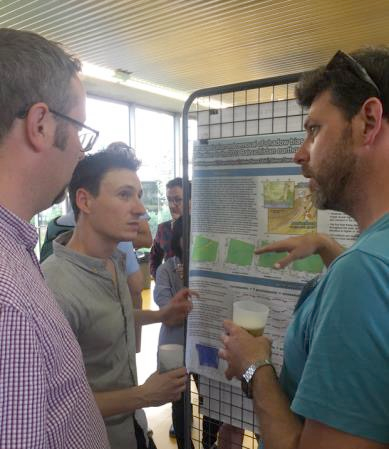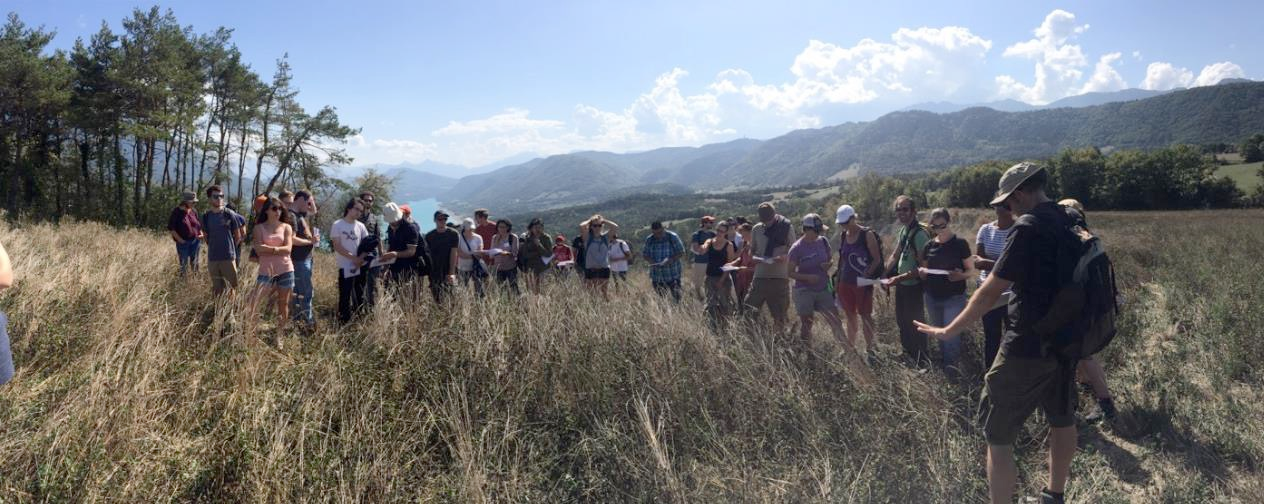March 2019
Contents
General Announcements
27th IUGG General Assembly, Montreal, Canada, July 8 – 18, 2019
Tribute to 100 years of the International Union of Geodesy and Geophysics in Potsdam near Berlin at the location of the former Royal Prussian Geodetic Institute
Meeting Announcements
Meetings Calendar
IAG Sponsored Meetings
4th Joint International Symposium on Deformation Monitoring (JISDM)
EUREF Symposium 2019
27th IUGG General Assembly
Munich Remote Sensing Symposium 2019 (MRSS19)
5th IAG Symposium on Terrestrial Gravimetry: Static and Mobile Measurements
2019 ILRS Technical Workshop
IAG Related Meetings
EGU General Assembly 2019
ION Pacific Positioning, Navigation and Timing (PNT) Conference
IGS 2019 Analysis Workshop
ESA Living Planet Symposium
Arctic Science Summit Week 2019
AOGS 16th Annual Meeting
Earth & Geo Science-2019
First International School on “Geoid Modelling, Gravity Inversion and its Applications”
4th Symposium of the Committee on Space Research (COSPAR)
Reports
19th General Assembly of WEGENER
The IAG Newsletter is under the editorial responsibility of the Communication and Outreach Branch (COB) of the IAG.
It is an open forum and contributors are welcome to send material (preferably in electronic form) to the IAG COB (newsletter@iag-aig.org). These contributions should complement information sent by IAG officials or by IAG symposia organizers (reports and announcements). The IAG Newsletter is published monthly. It is available in different formats from the IAG new internet site: http://www.iag-aig.org
Each IAG Newsletter includes several of the following topics:
- news from the Bureau Members
- general information
- reports of IAG symposia
- reports by commissions, special commissions or study groups
- symposia announcements
- book reviews
- fast bibliography
General Announcements
27th IUGG General Assembly, Montreal, Canada, July 8 – 18, 2019

The International Union of Geodesy and Geophysics (IUGG) holds its 27th General Assembly from July 8 to 18, 2019 in Montreal, Canada. The general assembly theme is the celebration of the centennial of the IUGG establishment in Brussels, Belgium, in 1919.
IUGG holds its General Assemblies every four years. Traditionally, the eight constituent associations of IUGG (Cryospheric Sciences, IACS; Geodesy, IAG; Geomagnetism and Aeronomy, IAGA;
Hydrological Sciences, IAHS; Meteorology and Atmospheric Sciences, IAMAS; Physical Sciences of the Ocean, IAPSO; Seismology and Physics of the Earth's Interior, IASPEI; and Volcanology and Chemistry of the Earth's Interior, IAVCEI) arrange their General Assemblies in parallel with the IUGG. This enables to hold joint inter-association symposia besides the specific association symposia and a greater involvement in the IUGG symposia.
There will be nine Union Symposia organized by IUGG and each of the associations in cooperation with the IUGG Commissions (Climatic and Environmental Changes, CCEC; Mathematical Geophysics, CMG; Geophysical Risk and Sustainability, GRC; Study of the Earth's Deep Interior, SEDI; Data and Information, UCDI; Planetary Sciences, UCPS), the IUGG Working Group on History (WGH), and the Global Geodetic Observing System (GGOS).
- U1 - Achieving Sustainable Development: The Role for Earth Sciences (IACS, CCEC),
- U2 - Georisk Reduction: Science, Resources, and Governmental Action (IAVCEI, GRC),
- U3 - Mathematics of Planet Earth: The Science of Data (IASPEI, CMG),
- U4 - Data-driven Science for Earth and Space Exploration (IAPSO, UCDI),
- U5 - New Discoveries in Earth Deep Interior (IAGA, SEDI),
- U6 - Recent Advances and Discoveries in Planetary Science and Comparative Planetology (IAMAS, UCPS),
- U7 - Centennial of the International Cooperation in Earth Sciences (IAHS, WGH),
- U8 - Earth and Space Observations (IAG, GGOS),
- U9 - Celebrating Early Career Scientists (IUGG).
In addition, there will be nine Union Lectures given in three special sessions by representatives of the IUGG and associations:
- David Grimes (IUGG): Earth Sciences as the Underlying Pillars to Meet Societal Challenges in the next Century;
- Waleed Abdalati (IACS): Exploring and Understanding Earth from Space: The Power of Perspective;
- Kosuke Heki (IAG): No geodesy, no geophysics;
- Lisa Tauxe (IAGA): Hunting the magnetic field;
- Veena Srinivasan (IAHS): Understanding and transforming water conflicts in the Anthropocene;
- Ed Hawkins (IAMAS): The value of rescuing millions of lost historical weather observations using volunteer citizen scientists;Karen Kohfeld (IAPSO): The Ocean’s Role in Atmospheric Carbon Dioxide Changes During Ice Age Cycles;
- Vera Schlindwein (IASPEI): Singing seismograms – harmonic tremor signals in seismological records;
- Paolo Papele (IAVCEI): Volcanic giants - what we know, what we think we know, what we can’t know about cataclysmic super-eruptions.
The joint symposia are always led by an association with co-conveners from other associations. IAG has the lead of the following Inter-Association Symposia:
- JG01 - Interactions of Solid Earth, Ice Sheets and Oceans;
- JG02 - Theory and Methods of Potential Fields;
- JG03 - Near-Real Time Monitoring of Regional to Global Scale Water Mass Changes;
- JG04 - Geodesy for Atmospheric and Hydrospheric Climate Research;
- JG05 - Remote Sensing and Modelling of the Atmosphere;
- JG06 - Monitoring Sea Level Changes by Satellite and In-Situ Measurements;
- JG07 - Monitoring, Imaging and Mapping of Volcanic Belts;
- JG08 - Earth Systems Literacy: Geophysics in K-16 Class Rooms, Outreach Projects, and Citizen Science Research Projects;
and IAG is sponsoring (with IAG co-conveners) the following Inter-Association Symposia led by other associations:
- JA01 - Geophysical Constraints on the Earth's Core and Its Relation to the Mantle;
- JA02 - Geophysical Data Assimilation;
- JA03 - Geophysical Records of Tectonic and Geodynamic Processes;
- JA06 - Space Weather Throughout the Solar System: Bringing Data and Models Together;
- JA07 - Geoscience Data Licensing, Production, Publication, and Citation (IAGA);
- JA08 - Probing the Earth’s Lithosphere and Its Dynamics Using Geophysical Modeling;
- JH02 - Climate and Hydrological Services: Bridging from Science to Practice and Adaptation;
- JP01 - Tides of the Oceans, Atmosphere, Solid Earth, Lakes and Planets;
- JS01 – Cryoseismology;
- JS02 - Early Warning Systems for Geohazards;
- JS03 - Subduction Zone Deformation and Structure: Tracking the Sea Floor in Motion;
- JS04 - Seismo – Geodesy;
- JS05 - Probabilistic & Statistical Approaches in Geosciences;
- JS06 - Old Data for New Knowledge: Preservation and Utilization of Historical Data in the Geosciences;
- JS07 - Integrated Geophysical Programs for Earth Systems Monitoring;
- JV03 - Strain Localisation and Seismic Hazards.
The IAG specific symposia are the main issue of the IAG General Assembly:
- G01 - Reference Systems and Frames;
- G02 - Static Gravity Field and Height Systems;G03 - Time-variable Gravity Field;
- G04 - Earth Rotation and Geodynamics;G05 - Multi-signal Positioning, Remote Sensing and Applications;
- G06 - Monitoring and Understanding the Dynamic Earth with Geodetic Observations.
For all details of the symposia descriptions and the program, please visit the IUGG2019 Homepage (http://iugg2019montreal.com/). The most important deadlines are:
- March 30, 2019: Abstract acceptance sent to participants;
- April 9, 2019: Early-bird registration closes.
IAG invites all geodesists to participate in the General Assembly 2019 and to present their work in one of the symposia. We look forward to seeing you in Montreal!
HERMANN DREWES
IAG Secretary General
Tribute to 100 years of the International Union of Geodesy and Geophysics in Potsdam near Berlin at the location of the former Royal Prussian Geodetic Institute
The Leibniz Society of Sciences in Berlin e. V. and the Helmholtz Center Potsdam GFZ German Research Center for Geosciences held a scientific colloquium on the site of the former Royal Observatories on Telegrafenberg hill in Potsdam on 15 February 2019 entitled "One and a half century of international cooperation of geodesists and geophysicists" to honor the founding of the IUGG 100 years ago. The colloquium was also supported by the DVW (German Association of Surveyors) and the Technical University of Berlin.

The International Association of Geodesy was represented by its current President Harald Schuh. He has been Director of the Geodesy Department at the GFZ since 2012 and member of the Leibniz Society since 2014. The colloquium was also an academic ceremony in honor of Helmut Moritz on the occasion of his 85th anniversary, who was President of the IAG from 1975 to 1979, its honorary President thereafter, and President of the IUGG from 1991 to 1995. Helmut Moritz has been a member of the Leibniz Society of Scientists since 1984. Renowned scientists from the research hubs of scientific geodesy Potsdam, Munich, Stuttgart and Hanover, Graz, Prague, Helsinki, and Moscow gave talks. With great joy and gratitude the colleagues from Austria, Finland, Czech Republic, and Russia were welcomed. They stand for their compatriots, who significantly promoted the reentry of German geodesists and geophysicists into the international community during the Cold War. Heidrun Kopp from the Helmholtz Centre GEOMAR, designated President of the German Geophysical Society (DGG), spoke about interlinkages of geodesy and geophysics, as well as the contributions of the DGG.
One of the organizers of the colloquium, the Leibniz Society, is today's legal-organizational successor of the Leibniz Society of Scholars which was founded in 1700 in Berlin by the Brandenburg Elector Frederick III. and endowed from 1701 onwards by King Frederick I of Prussia. Its informal member group Geodesy currently comprises Heinz Kautzleben (since 1979), Helmut Moritz (since 1984), Erik W. Grafarend (since 2004), Reiner Rummel (since 2007), Petr Holota (since 2013), Harald Schuh (since 2014), Hans Sünkel (since 2014), Jürgen Müller and Roland Pail (both since 2019).
The other organizer, the GFZ German Research Center for Geosciences, was founded in 1992 after German reunification. At its founding, the GFZ took over the care and continuation of the great traditions of the Potsdam-Telegrafenberg science location.
The program of the event can be viewed on the website of the Leibniz Society www.leibnizsozietaet.de.
The laudation for Helmut Moritz by Hans Sünkel (in German) can be downloaded here:
https://leibnizsozietaet.de/wp-content/uploads/2019/02/Beitrag-H.-S%C3%BCnkel.pdf
HEINZ KAUTZLEBEN,
member of the Leibniz Society, Fellow of IAG
Berlin, 23 February 2019
Meeting Announcement
Meetings Calendar
IAG Sponsored Meetings
4th Joint International Symposium on Deformation Monitoring (JISDM)
May 15 – 17, 2019, Athens, Greece
URL: http://jisdm2019.survey.ntua.gr/
EUREF Symposium 2019
May 22 – 24, 2019, Tallinn, Estonia
URL: http://www.maaamet.ee/euref2019/
27th IUGG General Assembly
July 8 – 18, 2019, Montreal, Canada
URL: http://www.iugg.org/assemblies/
Munich Remote Sensing Symposium 2019 (MRSS19)
September 18 – 20, 2019, Munich, Germany
URL: www.pf.bgu.tum.de/isprs/mrss19/index.html
5th IAG Symposium on Terrestrial Gravimetry: Static and Mobile Measurements
October 1 – 4, 2019, Saint Petersburg, Russia
URL: http://www.elektropribor.spb.ru/tgsmm2019/eindex
2019 ILRS Technical Workshop
October 21 – 25, 2019, Stuttgart, Germany
URL: https://ilrs.cddis.eosdis.nasa.gov/about/meetings.html
IAG Related Meetings
EGU General Assembly 2019
April 7-12 , 2019, Vienna, Austria
URL: http://www.egu2019.eu/
ION Pacific Positioning, Navigation and Timing (PNT) Conference
April 8-11 , 2019, Honolulu, Hawaii, USA
URL: https://www.ion.org/pnt/
IGS 2019 Analysis Workshop
April 15-17, 2019, Potsdam, Germany
URL: http://www.igs.org/events
ESA Living Planet Symposium
May 13-17 , 2019, Milan, Italy
URL: https://lps19.esa.int
Arctic Science Summit Week 2019
May 22-30 , 2019, Arkhangelsk ,Russia
URL: https://www.en.assw2019.science/
AOGS 16th Annual Meeting
July 28 – August 2, 2019, Singapore, Singapore
URL: http://www.asiaoceania.org/society/public.asp?view=up_coming
Earth & Geo Science-2019
August 12-13, 2019, Prague, Czech Republic
URL: https://scientificfederation.com/earth-science-2019/
First International School on “Geoid Modelling, Gravity Inversion and its Applications”
September 9-13, 2019, Gävle, Sweden
URL: https://www.hig.se/4.6c77c68166435adf0b3d060.html
4th Symposium of the Committee on Space Research (COSPAR)
November 4-8, 2019, Herzliya, Israel
URL: http://www.cospar2019.org/
Reports

19th General Assembly of WEGENER
The 19th General Assembly of the World Earthquake GEodesy Network for Environmental Hazard Research (WEGENER), on earth deformation and the study of earthquakes using geodesy and geodynamics, was held at the Site Bergès - CRAYA Amphitheatre in Grenoble University in Grenoble, France, from 10-13 September 2018.

Photo 1: The participants of the general assembly outside the conference venue in Grenoble.
WEGENER has primarily focused on the application of space geodetic and other disciplines to the study of geodynamics since it was established in the beginning of the 1980s. With the increasing number of researchers and areas involved in WEGENER, general assemblies of WEGENER have been organized biannually starting with 10 th General Assembly in 2000. Since 2012, it has become sub-commission 3.5 of International Association of Geodesy (IAG) commission 3, entitled as Tectonics and Earthquake Geodesy.
The 19th general assembly consisted of seven thematic sessions related to the “Tectonics and Earthquake Geodesy” that covered joint application of geodetic and other geoscientific methods to investigate geodynamics of the Earth. The sessions arranged by an international scientific committee with 26 scientists (details on https://wegener2018.sciencesconf.org/ ) are as follows;
- Active faults: reconciling short- and long-term observations
- The seismic cycle: from transient and precursory deformation to seismic rupture
- Technical and methodological developments, and large networks handling
- Intracontinental deformation and slowly deforming areas
- Multi-timescale glacier and landslide processes
- Improving understanding of magmatic and volcanic process
- Vertical movements of the earth surface, sea level and potential fields.
In the frame of this assembly, the local organizing committee led by Dr. Anne Socquet gathered 170 scientists from 27 countries across all continents for an intense scientific discussion for four days. 7 keynote speeches, 72 oral presentations and more than 100 poster presentations were given during the seven thematic oral and two poster sessions of the meeting.




The participants enjoyed a gala diner in restaurant “Le Téléphérique”, that offered delicious meals and a beautiful view on Grenoble and surrounding mountains.
One of the significant contributions of the General Assemblies of Wegener is the field trips where researches can investigate and discuss different tectonic structures in visited areas. During the 19 th General Assembly, the field trip took place in Triève on 13 th September 2018 in order to visit the active landslide of l’Harmalière, which is an instrumented site of Grenoble Observatory (OSUG).


The 19th general assembly has been sponsored by the International Union of Geodesy and Geophysics, the International Association of Geodesy, the Observatoire des Sciences de l’Univers de Grenoble, University Grenoble Alpes, and Institut d'ingénierie Univ. Grenoble Alpes.
All details of the assembly including detailed information about presentations and more photographs can be found at https://wegener2018.sciencesconf.org/.
The location of the next General Assembly held in 2020, will be decided by the WEGENER board during the splinter meeting on Wednesday, 10 April, 12:45–13:45 at room 2.61 of the European Geoscience Union (EGU) General Assembly 2019 which will take place in Vienna (Austria) on 7–12 April 2019.
In addition to its biannual meetings, WEGENER will conduct a session entitled “G3.4- Monitoring and modelling of geodynamics and crustal deformation: progress during 38 years of the WEGENER initiative” in Geodesy program group (G) of the EGU General Assembly 2019. During the meeting, recent multidisciplinary studies of Earth deformation using geodetic techniques (GPS, InSAR, LiDAR, space/air/terrestrial gravity, ground-based geodetic observations), complementary tectonic and geophysical observations, and modeling approaches focusing on the European-Mediterranean and Northern African regions will be discussed via seven oral and eighteen poster presentations on Wednesday, 10 April. The detailed information about the WEGENER meeting conducted in EGU General Assembly 2019 can be found at https://meetingorganizer.copernicus.org/EGU2019/session/30377.
PROF DR. HALUK OZENER
Chair of WEGENER
Chair of IAG- S.C.3.5.
| DOCUMENTS |
| IAG_Newsletter_March_2019.pdf |